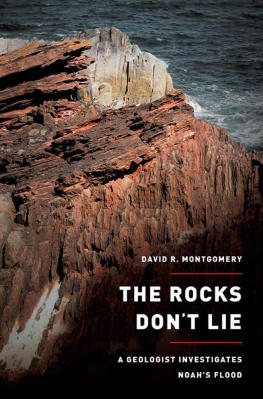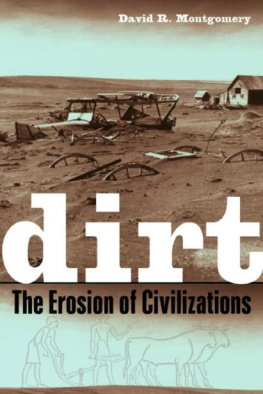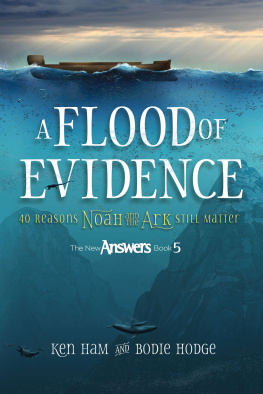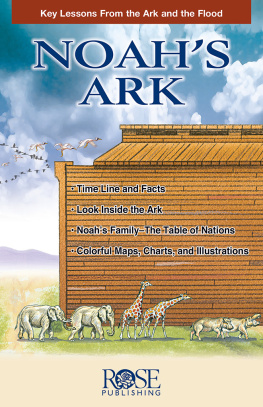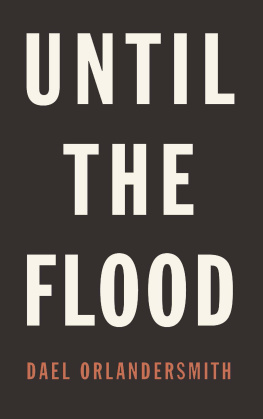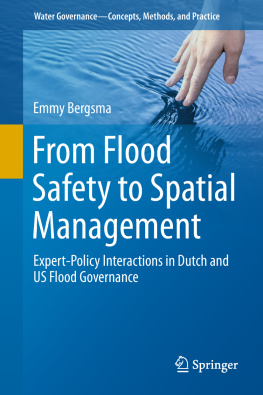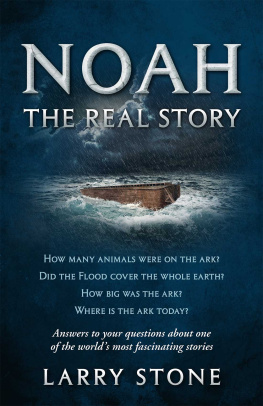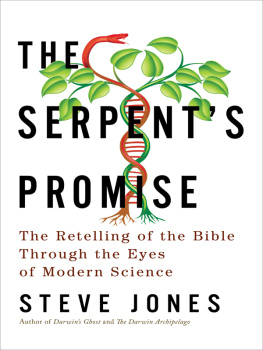Also by David R. Montgomery
Dirt: The Erosion of Civilizations
King of Fish: The Thousand-Year Run of Salmon

THE
ROCKS
DONT LIE

A Geologist Investigates
Noahs Flood

David R. Montgomery

W. W. Norton & Company
New York London
For my parents, Dave and Toby, with thanks for encouraging me to think.
Contents

Discovering evidence for an immense Tibetan flood shows the author that folktales can have an element of truth.
A hike out of the deepest hole in North America reveals Earths antiquity and fundamental problems with the creationist view of earth history.
Early Christians see evidence for Noahs Flood in fossils and rocks.
Seventeenth-century savants lay the foundation for modern geology through imaginative theories of how God triggered the Flood.
Recognition of fossils as the bones of extinct animals invalidates grand Flood theories.
An eighteenth-century Scottish farmer discovers geologic time and Christians reinterpret Genesis to accommodate an ancient world.
Nineteenth-century geologists refute the idea of a global flood as the most recent of a series of world-shattering catastrophes.
An introverted Englishman zealously reassembles cuneiform puzzles, proving that the biblical flood story is a Babylonian hand-me-down.
Scholars uncover the evolution of the Bible as anthropologists probe the roots of flood stories around the world.
A trip to the Creation Museum sheds light on the twentieth-century resurrection of creationism.
A geologist rediscovers grand catastrophes and creationists refuse to believe geologists have discovered Noahs Flood.
Modern creationists recycle seventeenth-century ideas to explain geological problems and miss the plate tectonics revolution.
The greatest story never toldthe way we read earth history shapes how we see the world.
Preface

A LL AROUND THE WORLD , mythology and folktales address the origin of topography, the form of the land itself. How should we read ancient stories, like accounts of great floods purporting to explain the origin of landforms? Can we regard them as tales of prehistoric events, or should we dismiss them as archaic superstition? As a geologist trained to read the history of the world from rocks and landforms, Im curious about the geological basis of folktales and how geography, culture, and tradition shape the way people see and interpret the land.
Investigating the origin of the worlds flood stories, some of humanitys oldest and most widely spread traditions, presents an intriguing challenge. Geologists tend to explain the prevalence of flood stories among ancient societies as simply reflecting the fact that floods are common natural disasters. But could there be more to stories of really big floods, or even the flood to end all floods, Noahs Flood?
Of all the sciences, geology is especially bound to the story of Noahs Flood. Historically, few things on the frontier between science and religion proved as contentious as the biblical stories of the Creation and Noahs Flood, the age of the world, and the genesis of topography. For two centuries, Christians have wrestled with contradictions between traditional biblical interpretations and geological discoveries. At the same time, debate over interpreting supposed signs of Noahs Flood made surprising contributions to the development of geology. This back-and-forth also proved central to the rise of modern creationism and its perception of geology as a fundamental threat to faith.
I started writing this book intending to present a straightforward refutation of creationism, the belief that the world is a few thousand years old and that all the worlds topographyevery mountain, hill, and valleywas formed by the biblical Flood. But as I read through old books I learned how stories about enormous floods shaped both scientific and religious views. I also came upon a different story about the nature of faith.
In looking into the origins of flood stories, and the story of Noahs Flood in particular, I thought Id find the standard conflict between reason and faith. Instead, I found a much richer story of people struggling to explain the worldand our place in it. The initial development of the discipline of geology was premised on the Flood as fact, which naturally led to imaginative theories of how to interpret the story of Noahs Flood. Later, with evidence literally in their hands and beneath their feet, geologists began to influence theology, showing that a global flood fell short when tested against the rocks that make up our world. Along the way, scientists were as apt to be blinded by faith in conventional wisdom as Christians proved adept at reinterpreting biblical stories to account for scientific findings. The historical relationship between science and religion was far more fluid, far more cross-pollinating than I ever thoughtor was taught at Sunday school or in college.
Little did I expect to learn that Niels Stensen, also known as Steno, the seventeenth-century grandfather of modern geology, invoked Noahs Flood to explain the origin of the landscape around Florence in his influential treatise on the nature of fossils. All too frequently, the history of science is simplified into a story of the light of reason dispelling the shadows of myth and superstition.
I was equally surprised to learn that the development of modern creationism originates in arguments within the fundamentalist community over how Noahs Flood explained geology. I did not expect to learn that the historic interplay between how Christians interpreted biblical stories and how scientists continually reinterpreted geological evidence helps explain the origin of modern creationism and why such beliefs arose in America. Neither did I realize that what we know today as creationism is one of the most recently evolved branches of Christianity, or that the founding fathers of modern creationism based their views, in part, on a perceptive critique of geology in the days right before the discovery of plate tectonics. Modern creationists had a rational basis for their argumentseven if they then recycled thoroughly discredited seventeenth-century theories to support their beliefs.
For readers seeking to delve deeper into the history of science and religion, and the topics touched upon in this book in particular, I have listed my sources at the end. I leave it to others to debate the long and fruitless search for Noahs ark and where it came to rest (Mount Ararat being a relatively recent addition to a long list of candidate sites). I will also steer clear of arguments over the size, design, and logistics of the ark, despite all the wonderfully imaginative ideas about how to accommodate a world of animals on a handmade lifeboat. And I leave debate about the question of intelligent design to theologians in whose purview inherently untestable ideas properly reside. While my geological background and training provide me with insight into earth historyhow to read stories archived in stone and etched upon the landI have no better idea than anyone why the universe exists and runs the way it does. Such questions are unanswerable, at least in this lifetime.
I found reading the historic works of theologians, natural philosophers, and scientists a fascinating experience, one that left me with an appreciation for the rich and engaging interplay between biblical interpretation and the development of geology. Noahs story is central to one of the longest-running debates between science and religion as people sought, and still seek, to reconcile scriptural interpretation with observations of the natural world. We mortals have long been struggling to understand who we are, and probably always will. Even today, interpretations of the biblical flood story remain central to understanding modern culture warsno matter how one views thembecause how we read ancient stories still defines the way we see the world, and thus ourselves.
Next page
